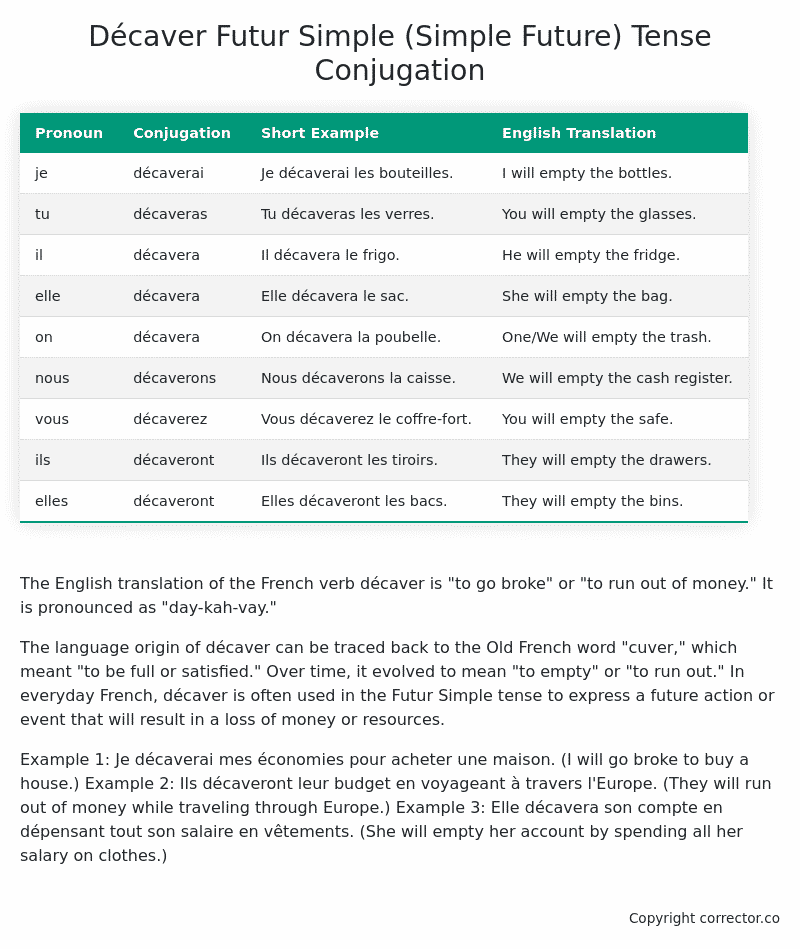Futur Simple (Simple Future) Tense Conjugation of the French Verb décaver
Introduction to the verb décaver
The English translation of the French verb décaver is “to go broke” or “to run out of money.” It is pronounced as “day-kah-vay.”
The language origin of décaver can be traced back to the Old French word “cuver,” which meant “to be full or satisfied.” Over time, it evolved to mean “to empty” or “to run out.” In everyday French, décaver is often used in the Futur Simple tense to express a future action or event that will result in a loss of money or resources.
Example 1: Je décaverai mes économies pour acheter une maison. (I will go broke to buy a house.)
Example 2: Ils décaveront leur budget en voyageant à travers l’Europe. (They will run out of money while traveling through Europe.)
Example 3: Elle décavera son compte en dépensant tout son salaire en vêtements. (She will empty her account by spending all her salary on clothes.)
Table of the Futur Simple (Simple Future) Tense Conjugation of décaver
| Pronoun | Conjugation | Short Example | English Translation |
|---|---|---|---|
| je | décaverai | Je décaverai les bouteilles. | I will empty the bottles. |
| tu | décaveras | Tu décaveras les verres. | You will empty the glasses. |
| il | décavera | Il décavera le frigo. | He will empty the fridge. |
| elle | décavera | Elle décavera le sac. | She will empty the bag. |
| on | décavera | On décavera la poubelle. | One/We will empty the trash. |
| nous | décaverons | Nous décaverons la caisse. | We will empty the cash register. |
| vous | décaverez | Vous décaverez le coffre-fort. | You will empty the safe. |
| ils | décaveront | Ils décaveront les tiroirs. | They will empty the drawers. |
| elles | décaveront | Elles décaveront les bacs. | They will empty the bins. |
Other Conjugations for Décaver.
Le Present (Present Tense) Conjugation of the French Verb décaver
Imparfait (Imperfect) Tense Conjugation of the French Verb décaver
Passé Simple (Simple Past) Tense Conjugation of the French Verb décaver
Passé Composé (Present Perfect) Tense Conjugation of the French Verb décaver
Futur Simple (Simple Future) Tense Conjugation of the French Verb décaver (this article)
Futur Proche (Near Future) Tense Conjugation of the French Verb décaver
Plus-que-parfait (Pluperfect) Tense Conjugation of the French Verb décaver
Passé Antérieur (Past Anterior) Tense Conjugation of the French Verb décaver
Futur Antérieur (Future Anterior) Tense Conjugation of the French Verb décaver
Subjonctif Présent (Subjunctive Present) Tense Conjugation of the French Verb décaver
Subjonctif Passé (Subjunctive Past) Tense Conjugation of the French Verb décaver
Subjonctif Imparfait (Subjunctive Imperfect) Tense Conjugation of the French Verb décaver
Subjonctif Plus-que-parfait (Subjunctive Pluperfect) Tense Conjugation of the French Verb décaver
Conditionnel Présent (Conditional Present) Tense Conjugation of the French Verb décaver
Conditionnel Passé (Conditional Past) Tense Conjugation of the French Verb décaver
L’impératif Présent (Imperative Present) Tense Conjugation of the French Verb décaver
L’infinitif Présent (Infinitive Present) Tense Conjugation of the French Verb décaver
Struggling with French verbs or the language in general? Why not use our free French Grammar Checker – no registration required!
Get a FREE Download Study Sheet of this Conjugation 🔥
Simply right click the image below, click “save image” and get your free reference for the décaver Futur Simple tense conjugation!

Décaver – About the French Futur Simple (Simple Future) Tense
Formation of Futur Simple
For regular -er verbs (e.g., parler – to speak)
For regular -ir verbs (e.g., finir – to finish)
For regular -re verbs (e.g., vendre – to sell)
Common Everyday Usage Patterns
Conditional Statements
Interactions with Other Tenses
Futur Antérieur
Conditional
Present
Summary
I hope you enjoyed this article on the verb décaver. Still in a learning mood? Check out another TOTALLY random French verb conjugation!


